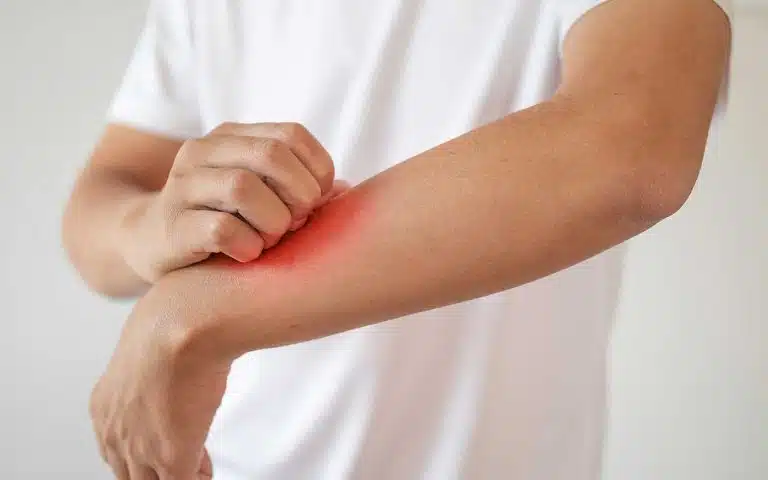Why Does Heroin Make You Itch?

Heroin is a powerful illicit opiate that has numerous effects on the brain and body. A common side-effect of heroin is an unpleasant itching sensation. Itching from heroin can lead to scratching, skin sores, and infections.
Recent research has found that heroin and other opioids may lead to itching because they cause the body to release histamines. Histamines are associated with seasonal allergies and bug bites and often trigger severe itching.
How Does Heroin Affect The Brain?
Heroin is an illicit drug made from morphine, which is derived from opium poppy plants. It usually comes as a powder that is snorted in the nose or injected directly into the bloodstream.
Once heroin is in the bloodstream, it quickly binds to opioid receptors in the central nervous system (CNS). These receptors are responsible for pain and pleasure, which makes them powerful pain relievers.
Once heroin activates opioid receptors, it releases a flood of dopamine in the brain. This causes pain relief but can also cause a rush of euphoria. Along with these effects, heroin can also cause additional side effects.
Some common side-effects of heroin may include:
- warm flushing of the skin
- heaviness in arms and legs
- dry mouth
- nausea
- vomiting
- severe itching
- constipation
- drowsiness
Itching is a common side-effect of opioids and usually occurs shortly after the drug enters the system. The itching can become persistent enough that it may lead to scabs, scarring, or infections.
What Causes Heroin Itching?
According to the National Institute On Drug Abuse (NIDA), when heroin activates opioid receptors it also activates nerve fibers that send messages to the brain that cause itchiness. This itchy sensation, known scientifically as pruritus, can lead to scratching in the torso and face.
Research has found that using opioids can activate receptors located on mast cells, which are associated with the immune system. Activating these receptors can cause a release of histamines, which are chemicals created when the body is fighting an allergy.
A 2014 study found that histamine levels were increased in opioid-dependent individuals compared to people who don’t use heroin. The release of histamines can cause the itching sensation also associated with insect bites and food allergies.
Effects Of Itching
Although itching is not typically life-threatening, it can increase the risk of health complications. Itchiness can lead to compulsive skin-picking and scratching that can cause scabs, scarring, and sores.
Sores can occur on the face and torso or at the site of injection in people who use heroin intravenously. These sores can become itchy as they heal and they can become infected if they are not treated properly.
Infected sores can become an abscess, which is a bacterial infection that causes a swollen pus-filled area on the skin. This may cause pain, tenderness, redness, and chills or fever. Abscesses usually require a professional to drain the area to allow it to properly heal.
Heroin Addiction Treatment
Along with an unpleasant itch sensation, heroin use can also lead to dangerous health consequences. Frequent use increases the risk of a heroin overdose and spreading infectious diseases, like hepatitis.
Heroin is highly addictive, which can quickly lead to tolerance and physical dependence. Once you become dependent, you are more likely to experience withdrawal symptoms when you stop.
If you think you or a loved one may have a heroin addiction, professional treatment can help you safely stop using heroin.
Treatment centers offer a variety of options that can be personalized to meet your individual needs. Many people choose to start treatment with detox, which provides 24/7 supervision and medications to ease withdrawal symptoms.
Following detox, you may choose to continue with a residential or outpatient program. These programs usually provide a variety of therapeutic groups and healthy activities. Many peer support groups, like Heroin Anonymous (HA), can help you maintain long-term recovery.
If you would like more information about heroin addiction treatment, please contact Ark Behavioral Health for more information.
Written by Ark Behavioral Health Editorial Team
©2024 Ark National Holdings, LLC. | All Rights Reserved.
This page does not provide medical advice.
National Institute On Drug Abuse (NIDA) - Real Teens Ask about Effects of Heroin
National Library Of Medicine - Neuraxial Opioid-Induced Pruritus: An Update
Pain Week - Opioid Side Effects: Why Opioids Cause Itching
Substance Abuse Treatment, Prevention, And Policy - Risk Of Anaphylaxis In Opioid Dependent Persons: Effects Of Heroin Versus Substitution Substance

Questions About Treatment?
Ark Behavioral Health offers 100% confidential substance abuse assessment and treatment placement tailored to your individual needs. Achieve long-term recovery.
100% confidential. We respect your privacy.
Prefer Texting?
Our friendly support team is here to chat 24/7. Opt out any time.







 Learn More
Learn More








